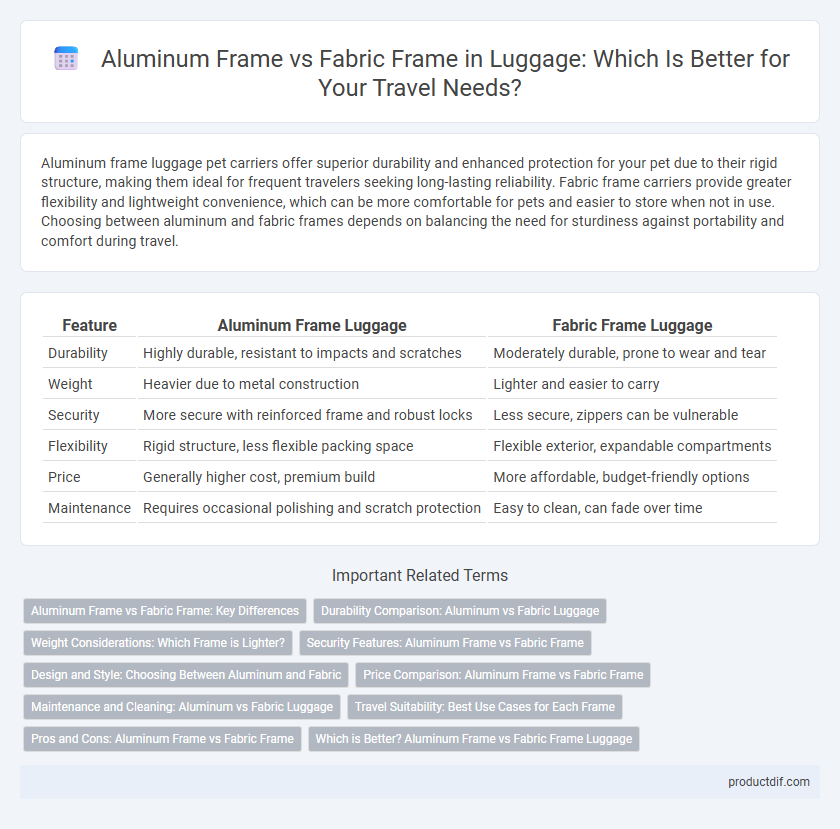Aluminum frame luggage pet carriers offer superior durability and enhanced protection for your pet due to their rigid structure, making them ideal for frequent travelers seeking long-lasting reliability. Fabric frame carriers provide greater flexibility and lightweight convenience, which can be more comfortable for pets and easier to store when not in use. Choosing between aluminum and fabric frames depends on balancing the need for sturdiness against portability and comfort during travel.
Table of Comparison
| Feature | Aluminum Frame Luggage | Fabric Frame Luggage |
|---|---|---|
| Durability | Highly durable, resistant to impacts and scratches | Moderately durable, prone to wear and tear |
| Weight | Heavier due to metal construction | Lighter and easier to carry |
| Security | More secure with reinforced frame and robust locks | Less secure, zippers can be vulnerable |
| Flexibility | Rigid structure, less flexible packing space | Flexible exterior, expandable compartments |
| Price | Generally higher cost, premium build | More affordable, budget-friendly options |
| Maintenance | Requires occasional polishing and scratch protection | Easy to clean, can fade over time |
Aluminum Frame vs Fabric Frame: Key Differences
Aluminum frame luggage offers superior durability, impact resistance, and enhanced protection for fragile items compared to fabric frame models. Fabric frame luggage provides greater flexibility, lighter weight, and often includes expandable compartments for increased packing capacity. Choosing between aluminum and fabric frames depends on the balance between durability needs and weight preferences for travelers.
Durability Comparison: Aluminum vs Fabric Luggage
Aluminum frame luggage offers superior durability with its rigid, impact-resistant structure that protects contents from rough handling and harsh travel conditions. Fabric frame luggage, made from materials like ballistic nylon or polyester, provides flexibility and resistance to tearing but may wear down faster under heavy use. Choosing between the two depends on prioritizing maximum protection versus lightweight convenience.
Weight Considerations: Which Frame is Lighter?
Aluminum frame luggage typically weighs more than fabric frame options due to the durability and rigidity of metal construction, averaging around 10-15 pounds for carry-ons. Fabric frames, often made from ballistic nylon or polyester, can weigh as little as 6-8 pounds, making them ideal for travelers prioritizing lightweight packing. Weight-conscious consumers should consider that fabric frames offer significant weight savings without sacrificing flexibility or storage capacity.
Security Features: Aluminum Frame vs Fabric Frame
Aluminum frame luggage offers enhanced security with reinforced locking mechanisms and a rigid structure that resists tampering and forced entry. Fabric frame luggage often relies on external locks and zippers, which are more vulnerable to cutting or picking. Travelers seeking maximum protection typically prefer aluminum frames due to their durability and integrated security features.
Design and Style: Choosing Between Aluminum and Fabric
Aluminum frame luggage offers a sleek, modern design with a metallic finish that appeals to travelers seeking durability and a premium look. Fabric frame luggage provides versatility in style with various colors and patterns, often featuring a softer, more flexible exterior suitable for casual travel. The choice between aluminum and fabric frames often depends on the desired aesthetic and the balance between lightweight comfort and robust protection.
Price Comparison: Aluminum Frame vs Fabric Frame
Aluminum frame luggage typically commands a higher price due to its durable, lightweight metal construction and enhanced protection for belongings. Fabric frame luggage offers a more budget-friendly option with lighter materials such as polyester or nylon, suitable for casual travelers seeking affordability. Consumers often weigh the premium cost of aluminum frames against the cost-effectiveness of fabric frames when prioritizing durability versus initial investment.
Maintenance and Cleaning: Aluminum vs Fabric Luggage
Aluminum frame luggage requires minimal maintenance, as its smooth, hard surface resists stains and can be easily wiped clean with a damp cloth, making it highly durable against scratches and dents. Fabric frame luggage demands more frequent cleaning and care to maintain appearance, often requiring spot cleaning and occasional deep washes to prevent dirt buildup and fabric wear. Both materials benefit from regular inspections, but aluminum's resistance to moisture and abrasions offers superior longevity with less intensive upkeep.
Travel Suitability: Best Use Cases for Each Frame
Aluminum frame luggage offers exceptional durability and security, making it ideal for frequent travelers and those carrying fragile items on business trips or long-haul flights. Fabric frame luggage provides lightweight flexibility and expandable storage, perfect for casual vacations, weekend getaways, and travel scenarios requiring easy packing and quick access. Choosing between aluminum and fabric frames depends on travel style, with aluminum suited for rugged conditions and fabric preferred for convenience and lighter loads.
Pros and Cons: Aluminum Frame vs Fabric Frame
Aluminum frame luggage offers superior durability, impact resistance, and enhanced security with its sturdy construction, making it ideal for frequent travelers and rough handling. Fabric frame luggage tends to be lighter and more flexible, providing expandable storage options and easier maneuverability, but it may wear out faster and offer less protection against heavy impacts. Choosing between aluminum and fabric frames depends on the balance between durability, weight, and storage needs for specific travel purposes.
Which is Better? Aluminum Frame vs Fabric Frame Luggage
Aluminum frame luggage offers superior durability, impact resistance, and security with its rigid structure and metal locks, making it ideal for frequent travelers who prioritize protection. Fabric frame luggage provides greater flexibility, lighter weight, and expandable compartments, enhancing packing capacity and ease of storage for casual users. Choosing between aluminum and fabric frames depends on travel style, with aluminum suited for heavy-duty use and fabric preferred for versatility and lightweight convenience.
Aluminum frame vs Fabric frame Infographic

 productdif.com
productdif.com